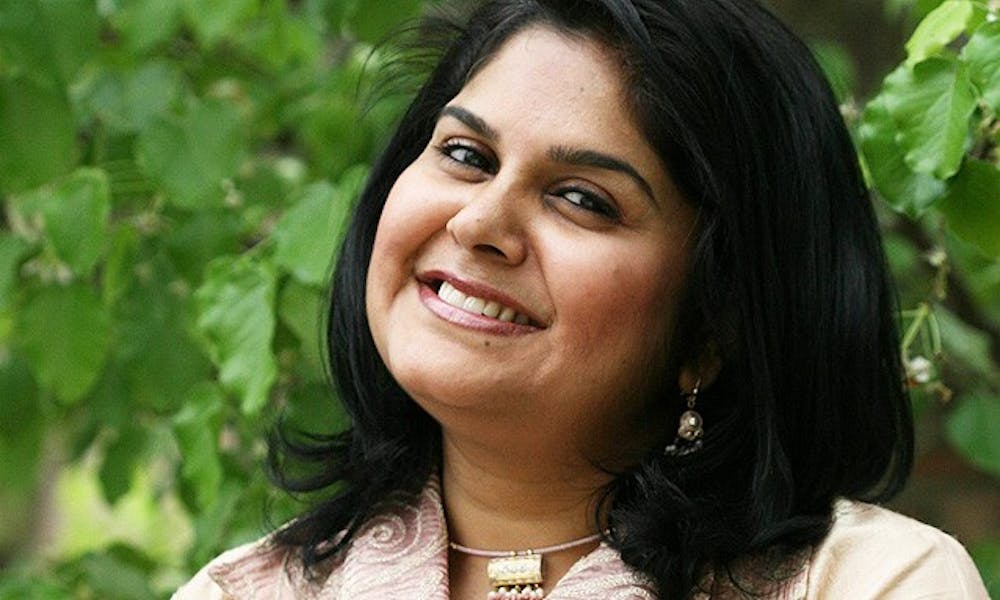The University appointed its first Hindu chaplain, Usha Rajagopalan, this August. The decision follows the creation of a dedicated Hindu and Buddhist prayer space, announced in early 2011. The Chronicle’s Matt Barnett corresponded with the new chaplain about her appointment and what it means for religious and Hindu life at Duke.
The Chronicle: Can you tell us a little about yourself?
Usha Rajagopalan: I love people and the nature of my work helped me make friends with people of all races, ethnicity and varied backgrounds. These interactions helped me feel a need to share my own identity as a Hindu American with people around me, and that meant I had to first go deep within myself to find myself. My passion to not be lost or forgotten as a Hindu-American in the many communities that I lived in guided me to share stories from my tradition ... I wore the hat of a storyteller. My own inner need for self-discovery found expression in the visual arts—painting, writing and Hindu art. Soon [my] focus shifted to offering worship services, or puja, to area Hindus ... My life has been a creative expression of my faith and the unfolding journey in every moment.
TC: What will your work as Hindu chaplain entail?
UR: My primary role will be to guide Hindu students in their practice and matters concerning religious life at Duke. Hinduism is not a religion since there is not one prophet, one sacred text, one form of worship—it is a way of life. Students can truly vary in their practice and expression of faith. Honoring their journey, being as inclusive as possible, providing tools to dive in deeper and creating balance in how they deal with the stress of a rigorous academic life are some aspects of my role. Celebration of major festivals is one way to bring these students with varied practices together. These gatherings are also helpful to invite members of other faith traditions to share our rich heritage and culture. I also welcome the opportunity to engage with the interfaith council to get to learn and share Hinduism with the leaders of other faith traditions.
TC: Last spring Duke saw the dedication of a designated Hindu and Buddhist prayer space in the Bryan Center. Does your appointment represent a shift in religious life at Duke?
UR: The designation of a prayer room is very significant both to the Hindu students as well as the Duke community as a whole. Before this designation, students were forced to pray wherever they could meet and find space on campus. [My] appointment shows a conscious commitment on the part of Duke to build bridges, learn about and validate the small community of Hindu students. I thank Dean [of the Chapel] Sam Wells and Associate Dean [for Religious Life] Christy Sapp for their vision. I hope the prayer room and Hindu chaplain position—two historical steps in promoting and honoring interfaith presence and dialogue at Duke—will open doors for other non-Abrahamic traditions like Sikhism and Jainism to also find expression in due course.
TC: Can you share your thoughts on religious diversity and interfaith dialogue?
UR: An institution that fairly represents the real world is a wonderful place to learn and grow. By recognizing and offering the space for the Hindus and Buddhists Duke has created a platform for expression of other non-Abrahamic traditions. When students of both faiths decided to share the prayer room, opportunities for inter-faith dialogue were created right away. Extending this experience through dialogue with the other faith traditions and attending holiday celebrations creates new avenues to learn about each other’s culture, traditions and find common threads to connect us all as one people many traditions. People of faith are significantly shaped by it. When ample opportunities for interfaith dialogue are offered, as students leave this institution to join the work force they are well prepared to trust, work and collaborate in serving the larger whole.
TC: Can you tell us about the Hindu community at Duke?
UR: There are over 300 Hindu students at Duke and over 150 faculty members—a significant number for an academic institution. Kishore Trivediji, [Hudson Professor of Electrical and Computer Engineering] has volunteered for over a decade as a faculty advisor for the Hindu Student Association and Leela Prasad, [associate professor of religion and faculty director of the Duke Center for Civic Engagement,] serves as mentor through the department of religion. This position would not have been possible without the support of some generous contributions from the Hindu faculty. I thank them all.
TC: What challenges does it face?
UR: HSA students feel that Hinduism is misunderstood, misrepresented and a few who take interest in learning about it, intellectualize it. There are many myths about our practice and the only way for the other students to appreciate and learn about our faith is to see Hindus come together and collectively make their presence felt.
TC: What can students who don’t identify with Hinduism learn from Hinduism?
UR: Complete freedom and choice in their practice. [Hindu] openness, universal principle of sisterhood and love and respect for life as a whole is a practice [Hindus] have embraced for over 4,000 years. As the oldest organized faith tradition and third largest in the world, it is truly beneficial for non-Hindus to know about this faith. [Hinduism’s] transformative quality is very evident in the way Americans have adapted yoga and transcendental meditation into their daily life. Yoga is no longer a Hindu Sanskrit word but part of the mainstream American vocabulary and practice .... I invite all Hindu students, faculty and members of other faith traditions to use this platform that Duke has provided us to learn from each other.
Get The Chronicle straight to your inbox
Signup for our weekly newsletter. Cancel at any time.

